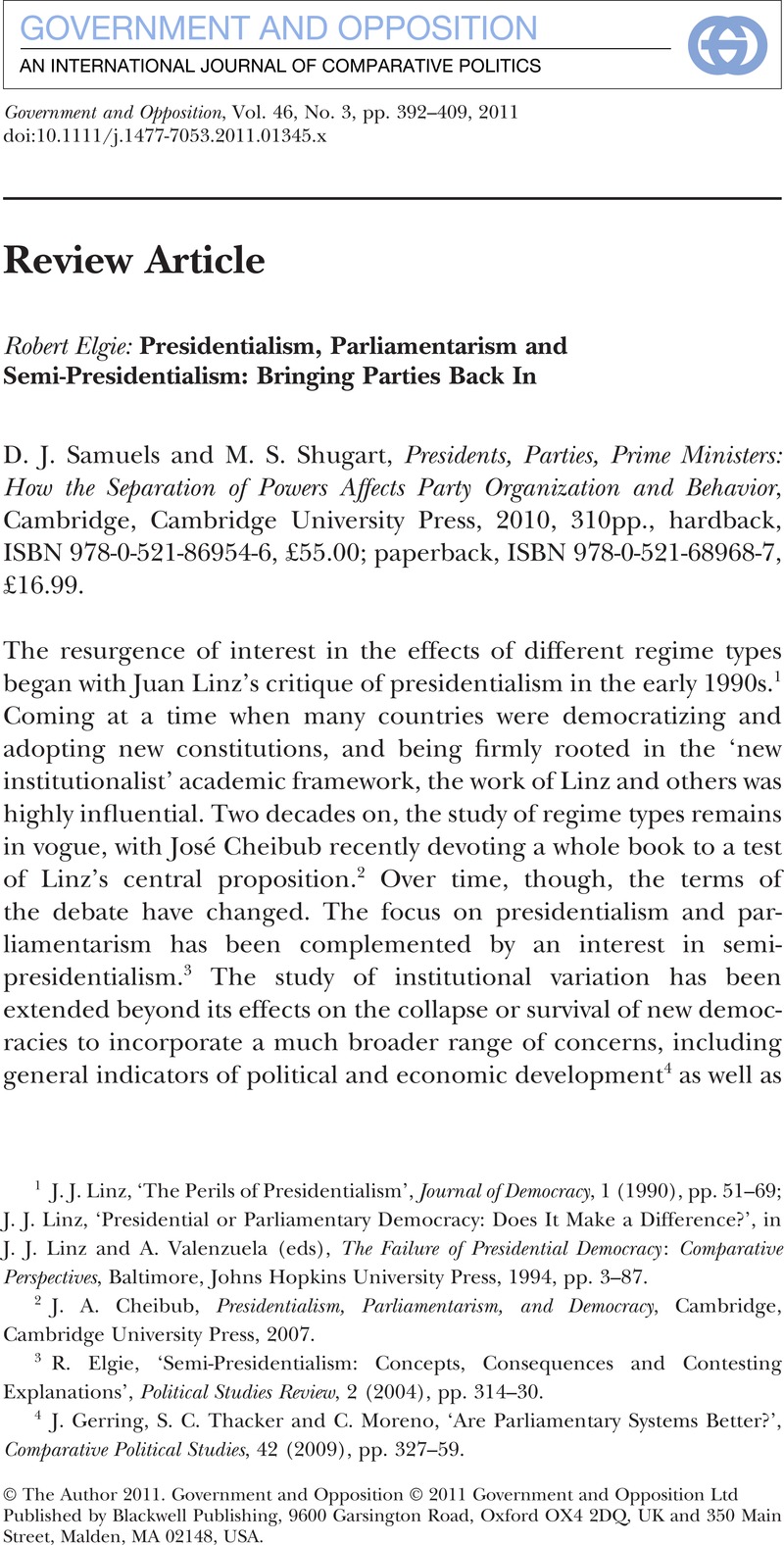Published online by Cambridge University Press: 02 January 2013

1 Linz, J. J., ‘The Perils of Presidentialism’, Journal of Democracy, 1 (1990), pp. 51–69 Google Scholar; J. J. Linz, ‘Presidential or Parliamentary Democracy: Does It Make a Difference?’, in J. J. Linz and A. Valenzuela (eds), The Failure of Presidential Democracy: Comparative Perspectives, Baltimore, Johns Hopkins University Press, 1994, pp. 3–87.
2 J. A. Cheibub, Presidentialism, Parliamentarism, and Democracy, Cambridge, Cambridge University Press, 2007.
3 Elgie, R., ‘Semi-Presidentialism: Concepts, Consequences and Contesting Explanations’, Political Studies Review, 2 (2004), pp. 314–30CrossRefGoogle Scholar.
4 Gerring, J., Thacker, S. C. and Moreno, C., ‘Are Parliamentary Systems Better?’, Comparative Political Studies, 42 (2009), pp. 327–59CrossRefGoogle Scholar.
5 Reiter, D. and Tilman, E. R., ‘Public, Legislative, and Executive Constraints on the Democratic Initiation of Conflict’, Journal of Politics, 64 (2002), pp. 810–26CrossRefGoogle Scholar.
6 G. Tsebelis, Veto Players: How Political Institutions Work, Princeton, Princeton University Press, 2002.
7 K. Strøm, W. C. Müller and T. Bergman (eds), Delegation and Accountability in Parliamentary Democracies, Oxford, Oxford University Press, 2004.
8 Elgie, R., ‘From Linz to Tsebelis: Three Waves of Presidential/Parliamentary Studies?’, Democratization, 12 (2005), pp. 106–22CrossRefGoogle Scholar.
9 D. J. Samuels and M. S. Shugart, Presidents, Parties, Prime Ministers: How the Separation of Powers Affects Party Organization and Behavior, Cambridge, Cambridge University Press, 2010.
10 Ibid., p. xi.
11 Ibid., p. 22.
12 Ibid., p. 14.
13 R. Elgie, ‘From Linz to Tsebelis’.
14 Samuels and Shugart, Presidents, Parties, Prime Ministers, p. 250.
15 Maurice Duverger, Political Parties: Their Organization and Activity in the Modern State, London, Methuen, 1954.
16 Samuels and Shugart, Presidents, Parties, Prime Ministers, p. 7.
17 Ibid.
18 Ibid., p. 18.
19 Ibid., p. 37, emphasis in the original.
20 Ibid., p. 15.
21 Ibid., p. 16.
22 Ibid., p. 17.
23 Ibid., p. 18.
24 Ibid., p. 50.
25 Ibid., p. 15.
26 Ibid., pp. 15–16, emphasis in the original.
27 Ibid., p. 47.
28 Ibid., p. 48.
29 Ibid., p. 108.
30 Ibid., p. 256.
31 Ibid., p. 120, emphasis in the original.
32 Ibid., p. 123.
33 Ibid., p. 221, emphasis in the original.
34 For example, Treier, S. and Jackman, S., ‘Democracy as a Latent Variable’, American Journal of Political Science, 52: 1 (2008), pp. 201–17CrossRefGoogle Scholar; and Vreeland, J. R., ‘The Effect of Political Regime on Civil War: Unpacking Anocracy’, Journal of Conflict Resolution, 52: 3 (2008), pp. 401–25CrossRefGoogle Scholar.
35 Bayer, R. and Bernhard, M., ‘The Operationalization of Democracy and the Strength of the Democratic Peace: A Test of the Relative Utility of Scalar and Dichotomous Measures’, Conflict Management and Peace Science, 27: 1 (2010), pp. 85–101 CrossRefGoogle Scholar.
36 Bogaards, M., ‘Measures of Democratization: From Degree to Type to War’, Political Research Quarterly, 63: 2 (2010), pp. 475–88CrossRefGoogle Scholar.
37 In addition, Samuels and Shugart include Papua New Guinea from 1975 to 2007, even though Polity has now reclassified this whole period as +4.
38 Samuels and Shugart, Presidents, Parties, Prime Ministers, p. 88.
39 Ibid., p. 260.
40 The collapse of democracy in Finland in 1931 is another example, but it lies outside the timeframe of Samuels and Shugart's study.
41 This document is available in French at http://mjp.univ-perp.fr/constit/mg1991.htm, accessed 17 January 2011.
42 The text of the 1992 constitution is available in English at http://www.chr.up.ac.za/undp/domestic/docs/c_Madagascar.pdf, accessed 17 January 2011.
43 The changes in the wording of Articles 53 and 90 are key in this regard. The text is available in J. du Bois de Gaudusson, G. Conac and C. Desouches (eds), Les Constitutions africaines publiées en langue française. Tome 1, Paris, La Documentation française, 1998, pp. 390–408.
44 After the 1998 changes it became easier for the legislature to dismiss the government if the latter made a bill a matter of confidence. The text of the 1998 constitution is available in French at http://mjp.univ-perp.fr/constit/mg1998.htm, accessed 17 January 2011.
45 Samuels and Shugart, Presidents, Parties, Prime Ministers, p. 257.
46 Ibid., pp. 88–90.
47 On a separate issue, Samuels and Shugart include Ireland in their data set from 1952, but using their Polity criteria it would seem to require inclusion from 1945.
48 Samuels and Shugart, Presidents, Parties, Prime Ministers, p. 123.
49 Ibid., pp. 123–4.
50 In this regard, see the publications of Philip Cowley at: http://www.nottingham.ac.uk/politics/staff/philip.cowley, accessed 18 January 2011.
51 Samuels and Shugart, Presidents, Parties, Prime Ministers, p. 260.
52 Ibid., p. 173, emphasis in the original.
53 Ibid., p. 177.
54 Ibid., pp. 262–4.
55 Ibid., p. 45.
56 Ibid., pp. 45–6. Again, their case selection means that they exclude periods of president-parliamentary cohabitation during the Weimar Republic as well as more recently in São Tomé and Príncipe. In addition, there have been periods of cohabitation in de facto parliamentary Austria and Iceland.
57 Elgie, R., ‘Semi-Presidentialism, Cohabitation and the Collapse of Electoral Democracies 1990–2008’, Government and Opposition, 45: 1 (2010), pp. 29–49 CrossRefGoogle Scholar.
58 R. Elgie and P. Schleiter, ‘Variation in the Durability of Semi-Presidential Democracies’, in R. Elgie, S. Moestrup and Y-S. Wu (eds), Semi-Presidentialism and Democracy, London, Palgrave, 2011, pp. 42–60.